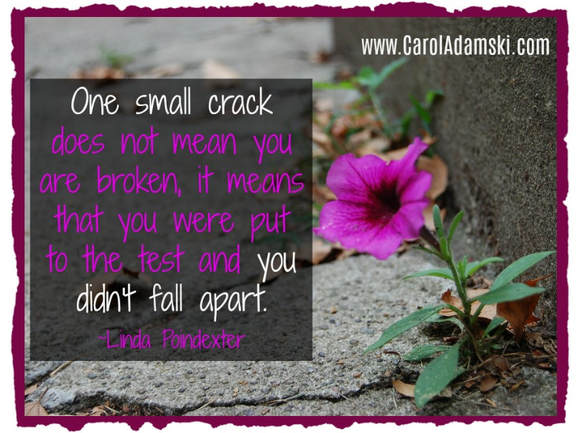“Life doesn’t get easier or ore forgiving, we get stronger and more resilient.” ~Steve Marabol
- They practice mindfulness and purposefully pay attention to their life
- They possess a solid self esteem
- Recognizing that this too shall pass
- Use past successes to confront current challenges
- Not comparing themselves to others
- Realizing setbacks and adversity are stepping stones to transformation
- Finding humor in every situation
- They relinquish control
Thankfully, with the perspective gained from life experience as well as the ability to better manage emotions, those in their middle years possess characteristics and behaviors that may allow resiliency to be more easily developed.
Here are 7 ways to raise your resilience factor:
1. Be optimistic-Think positive thoughts and surround yourself with uplifting people. Take each ‘setback’ and consider the options it allows rather than succumbing to self doubt or defeat.
2. Reframe your story-Numerous studies have proven that rewriting our personal narratives positively influences our view of ourselves and the world around us. Focus on how a specific stressor contributes to your personal growth and what you can offer the world.
4. Reflect on prior comebacks-Instead of telling ourselves others have it worse than we do, shift your thoughts to the positive and instead, reflect on those challenges in the past that you have overcome. Says Dr. Grant, “Look back and say, ‘I’ve gone through something worse in the past. This is not the most horrible thing I have ever faced or will ever face. I know I can deal with it.’”
5. Give support to others-Its been proven that people are more resilient when they have a strong foundation of support. But, resilience is also increased by giving support to others; being an encouraging and uplifting force for others. A 2017 study of psychological resilience among American military veterans showed increased levels of gratitude, altruism and a sense of purpose predicted resiliency.
6. Take stress breaks-Humans learn during times of stress and there is no life completely void of stress. When we invite manageable stressors into our lives, we can stimulate personal growth as well as our ability to bounce back. It is critical to create opportunities to temporarily remove ourselves from stressful situations by taking a walk, mediating, getting a massage, or meeting a friend for coffee. Each of these stress breaks allows our body to recover so that we are better able to manage life’s various challenges.
7. Push your personal envelope-When we step outside of our comfort zone and put ourselves into challenging situations, we exercise that resiliency muscle. By engaging our stress hormone system purposefully, it mitigates “flare ups,” enabling us to better handle unplanned stressful circumstances.
By reframing how we think of our situations, surrounding ourselves with positive people and thinking optimistically, as well as inviting manageable stress by moving outside our comfort zone, supporting others and taking breaks from stressful situations, we can actively build our resiliency reserves.
Article excerpt from the New York Times.

 RSS Feed
RSS Feed